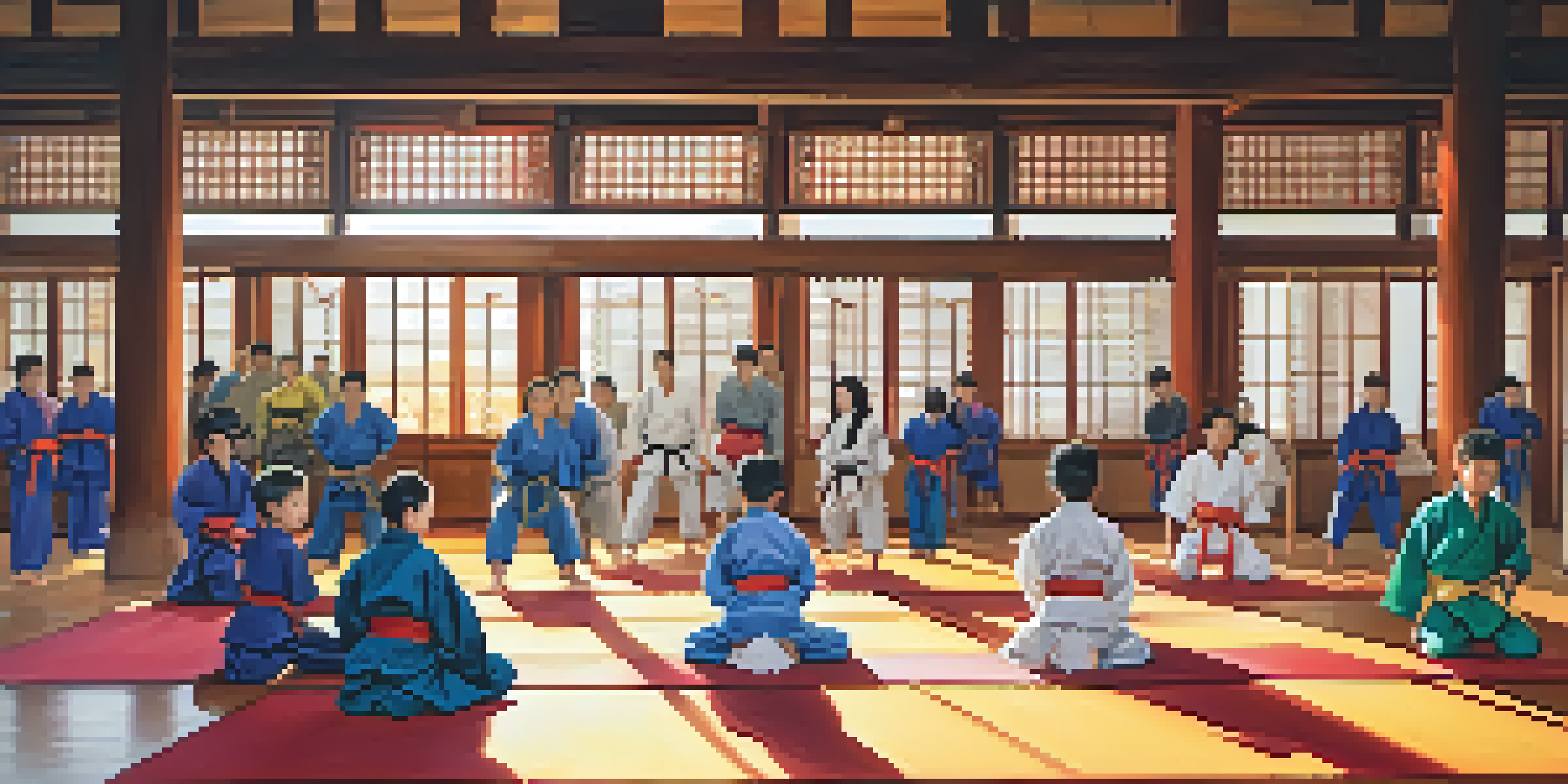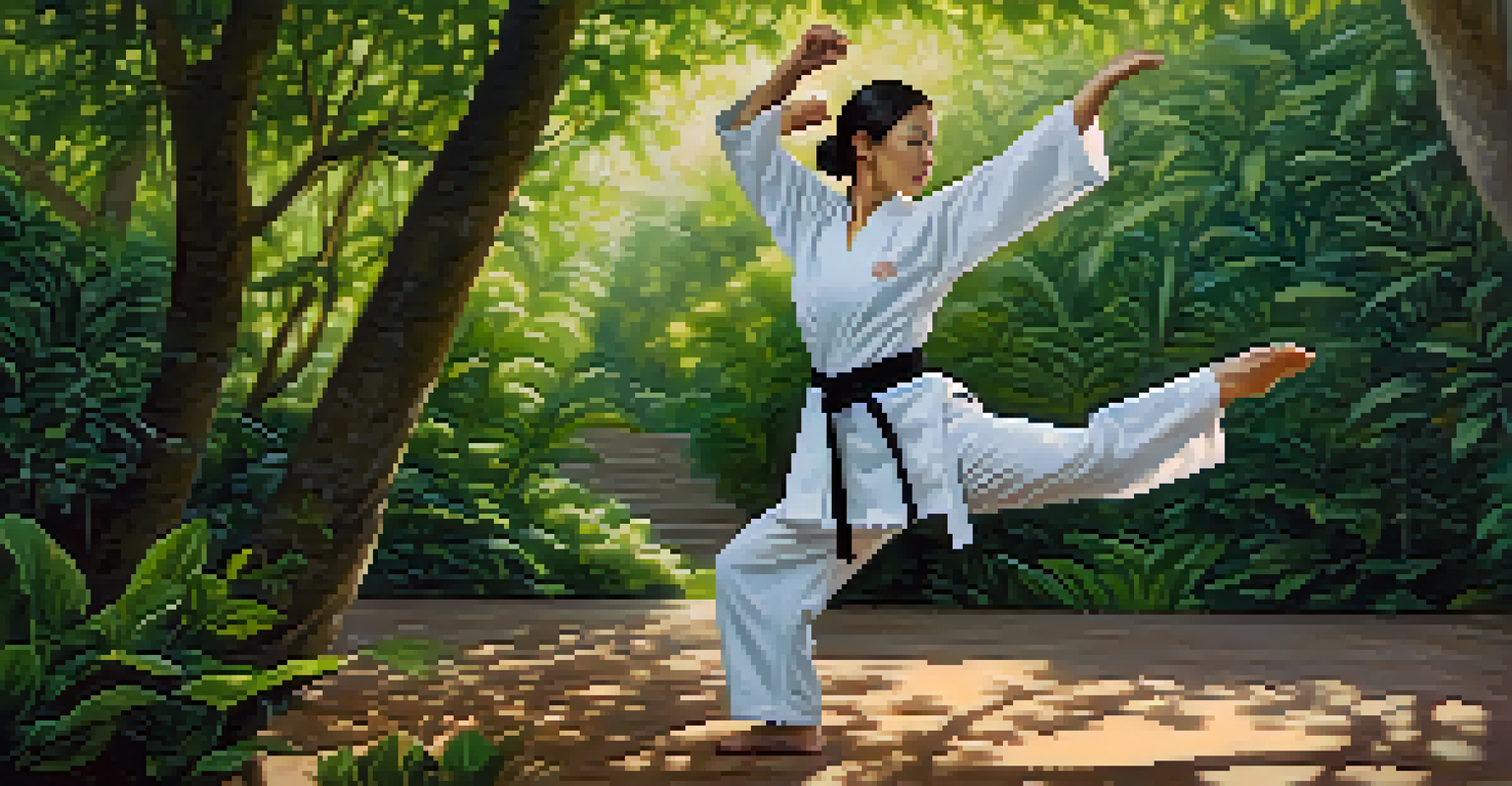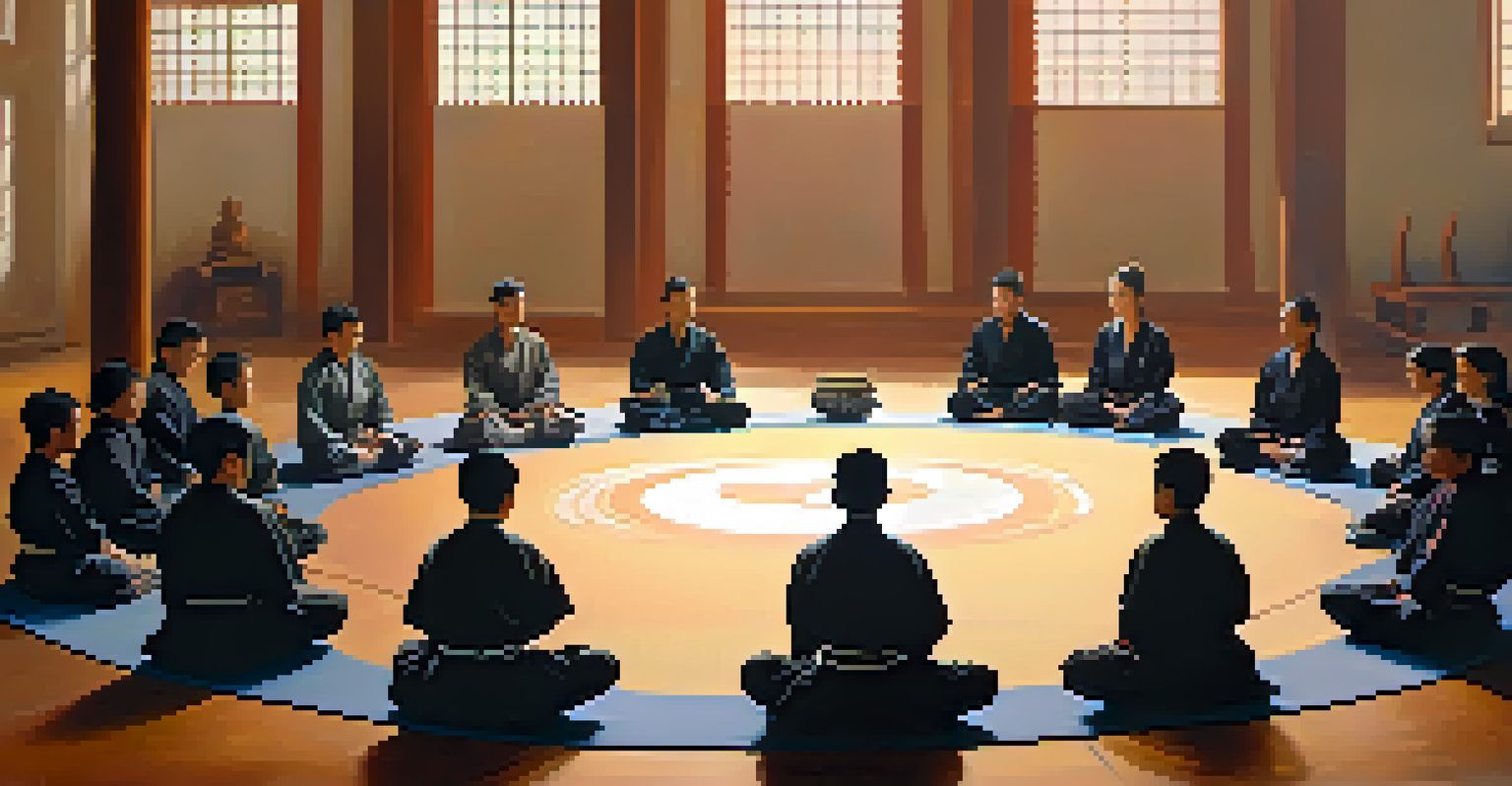Building Community Through Martial Arts: A Social Justice Lens

Understanding the Intersection of Martial Arts and Community
Martial arts is often seen as a way to learn self-defense or improve fitness, but its impact goes much deeper. At its core, martial arts is about building a sense of community, where individuals come together to share experiences, learn from each other, and grow. This communal approach fosters connections that can empower individuals, making them feel part of something bigger than themselves.
Martial arts is not about fighting; it's about building a community of respect and perseverance.
The practice often includes elements of respect, discipline, and teamwork, which help to cultivate strong bonds among practitioners. These shared values create a welcoming environment, encouraging participation from people of all backgrounds. When individuals train together, they build friendships and trust, forming a supportive network that extends beyond the dojo.
Moreover, martial arts can be a powerful tool for social change. By creating inclusive spaces where everyone feels valued, martial arts can challenge societal norms and promote equity. This is particularly important in communities facing marginalization, where the sense of belonging can help heal divisions and foster understanding.
Martial Arts as a Tool for Empowerment and Resilience
Empowerment is a key principle within martial arts, which equips individuals with skills that translate into real-life confidence. This self-assurance is particularly vital for marginalized groups who may feel powerless in their daily lives. By learning martial arts, they can reclaim their sense of agency, making them less vulnerable to discrimination and violence.

Resilience is another important aspect. The practice teaches individuals to face challenges head-on, whether in sparring matches or personal struggles. This resilience not only applies to physical confrontations but also to overcoming obstacles in life, such as academic or professional hurdles. Through martial arts, practitioners learn that setbacks are just stepping stones on the path to success.
Martial Arts Build Community Bonds
Martial arts foster connections and support networks among diverse individuals, enhancing a sense of belonging.
The community aspect of martial arts training further amplifies this empowerment. When individuals support each other in their journeys, they create a culture of resilience that benefits everyone. This collective strength can lead to broader societal changes, as empowered individuals are more likely to advocate for justice and equality.
Promoting Diversity and Inclusion in Martial Arts
One of the most beautiful aspects of martial arts is its ability to bring together people from various backgrounds, cultures, and abilities. This diversity enriches the training environment and fosters a deeper understanding of different perspectives. When martial arts schools prioritize inclusion, they set the stage for meaningful interactions that can break down barriers.
The greatest weapon against stress is our ability to choose one thought over another.
By intentionally creating inclusive spaces, martial arts instructors can challenge stereotypes and encourage mutual respect. This not only enhances the learning experience but also empowers students to become advocates for diversity in their own communities. Moreover, it highlights the importance of representation, as students see role models who look like them in positions of leadership.
Diversity in martial arts also extends to teaching styles and philosophies. Different martial arts forms bring unique cultural histories and techniques that can be shared and celebrated. This exchange of ideas not only enriches the practitioners’ understanding but also promotes cultural awareness and respect.
Martial Arts and Mental Health: A Path to Healing
Mental health is an often-overlooked aspect of community well-being. Martial arts can play a significant role in promoting mental health by providing an outlet for stress relief and emotional expression. The physical activity involved releases endorphins, which can improve mood and reduce anxiety, fostering a healthier mindset among practitioners.
Moreover, the discipline and focus required in martial arts training can serve as a form of mindfulness. Practitioners learn to be present in the moment, which can combat feelings of overwhelm and distraction. This practice of mindfulness can be particularly beneficial for those dealing with trauma or stress-related disorders.
Empowerment Through Resilience Training
Practicing martial arts equips individuals with confidence and resilience, helping them navigate life's challenges.
The community built around martial arts also provides a support system that can aid in mental healing. Knowing that others share similar struggles can be comforting and can help individuals feel less isolated. This sense of belonging is crucial for mental health and can inspire individuals to seek help and engage in open conversations about their struggles.
Building Bridges: Martial Arts and Intercultural Dialogue
Martial arts offer a unique platform for intercultural dialogue, where practitioners from diverse backgrounds can come together. Engaging in this shared practice creates opportunities for conversations about cultural differences and similarities. This dialogue is essential for fostering understanding and respect among different communities.
By participating in international martial arts events or cross-cultural exchanges, practitioners can learn about various traditions and philosophies. This exposure broadens perspectives and encourages empathy, as individuals witness firsthand the values and experiences of others. Such experiences can break down prejudices and build lasting friendships.
Additionally, martial arts can serve as a bridge for communities facing conflict. Shared training experiences can promote collaboration and understanding, transforming adversarial relationships into partnerships. This transformation can lead to meaningful change in communities, where individuals who once viewed each other as opponents become allies.
Social Justice Initiatives within Martial Arts Communities
Many martial arts schools are now actively engaging in social justice initiatives, demonstrating their commitment to community well-being. These initiatives range from offering free classes to marginalized groups to organizing community outreach programs. By doing so, they create opportunities for individuals who may not otherwise have access to martial arts training.
Moreover, martial arts organizations are increasingly addressing social issues such as violence prevention and self-defense education. Workshops and seminars can empower individuals, particularly women and LGBTQ+ communities, by teaching them how to protect themselves. This proactive approach not only enhances personal safety but also promotes awareness of broader societal issues.
Martial Arts Promote Social Justice
Many martial arts schools engage in social justice initiatives, using their platform to advocate for equity and inclusion.
Engaging in social justice initiatives reinforces the values of martial arts. Practitioners are reminded that their skills and training can serve a greater purpose beyond personal achievement. This alignment with social justice fosters a culture of compassion and responsibility, inspiring individuals to advocate for positive change in their communities.
The Future of Martial Arts in Promoting Social Justice
As the world continues to evolve, the role of martial arts in promoting social justice is likely to expand. With growing awareness of social issues, martial arts communities have the potential to become powerful advocates for change. By embracing this responsibility, they can inspire others to take action and foster a culture of inclusivity and equity.
The future may see more martial arts schools partnering with local organizations to address community needs. These collaborations can amplify efforts to promote social justice, making martial arts a vital component of community development. By working together, martial artists can create lasting impact and drive meaningful change.

Ultimately, the essence of martial arts lies in its ability to unite people and promote understanding. As practitioners continue to champion social justice, they not only strengthen their own communities but also contribute to a more equitable society. The journey of building community through martial arts will undoubtedly pave the way for future generations to thrive in an environment rooted in respect and compassion.